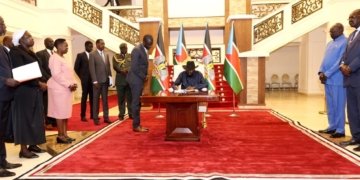KAMPALA, Uganda (BG) — The African Union (AU) has taken a significant step toward securing food security by adopting a new agricultural development strategy to transform Africa’s agrifood systems.
The strategy, part of the Comprehensive Africa Agriculture Development Programme (CAADP), seeks to increase agrifood output by 45% by 2035.
As part of this effort, AU member states endorsed the 10-year CAADP Strategy and Action Plan alongside the Kampala Declaration on Building Resilient and Sustainable Agrifood Systems in Africa.
AU leaders formalized the decision during the African Union Extraordinary Summit on the Post-Malabo CAADP, held on Jan. 9–11, 2025, in Kampala, Uganda.
Six Commitments for Agricultural Transformation
The Kampala Declaration outlines six key commitments by the AU’s 55 member states to strengthen Africa’s agri-food systems.
Leaders emphasized the urgency of increasing agricultural production and trade, citing Africa’s projected population growth to 2.5 billion by 2050 and the global population’s rise to 9.8 billion.
AU heads of state pledged to intensify sustainable food production, agro-industrialization, and trade to address rising food demands.
The strategy targets a 50% reduction in post-harvest losses, a tripling of intra-African trade in agrifood products and inputs by 2035, and an increase in the share of locally processed food to 35% of agrifood GDP, according to the AU.
Museveni Urges Value Addition and Open Trade
Ugandan President Yoweri Kaguta Museveni called on African leaders to prioritize value addition in agricultural production.
“This Africa of having no food and begging is not the real Africa, but the colonial and neo-colonial Africa. It is a shame,” Museveni said.
He criticized external pressures that discourage Africa from moving beyond raw material production and stressed the importance of vertical integration in agriculture.
Museveni also urged the removal of non-tariff barriers (NTBs) that hinder agricultural trade within Africa.
He said the potential of Ugandan agricultural exports is often hindered by restrictive actions from neighboring countries, causing significant disruptions in production and trade.
This highlights the urgent need for collaborative solutions to enhance regional cooperation and support Uganda’s agricultural growth.
Calls for Faster Progress
African Union Commission (AUC) Chairperson Moussa Faki Mahamat acknowledged that progress under the Malabo Declaration since 2014 has been slower than desired.
“The various biennial evaluations of the commitments made by Member States, initiated in 2017 under this declaration, certainly show progress towards achieving the set objectives, but at an unsatisfactory pace,” Faki said.
He commended the collaborative work behind the Kampala Declaration, crediting member states, AU institutions, and development partners for their contributions.
Ethiopian President Taye Atske Selassie stressed the urgency of unified action to achieve a food-secure and prosperous Africa.
“This Summit marks a defining moment for Africa, where we will be able to chart out the course of the continent’s agrifood system,” Selassie said.
Ambassador Josefa Sacko, AU Commissioner for Agriculture, Rural Development, Blue Economy, and Sustainable Environment, emphasized that the Kampala plan differs from past declarations by including a detailed action strategy.
“We now have a clear roadmap, a theory of change that outlines the pathway to transformation, realistic and implementable strategic objectives, a broad policy scope enhancing food system approaches, and targets that reflect the continent’s aspirations,” Sacko said.
International Support
International partners have voiced their support for the AU’s bold strategy. Norway’s State Minister and development partner representative, Bjørg Sandkjær, praised the plan’s alignment with Africa’s long-term goals.
“We commend this bold vision, which aligns with the continent’s broader aspirations for prosperity, resilience and inclusive development through the AU Agenda 2063,” Sandkjær said.
Adopting the CAADP Strategy and Action Plan 2026–2035 is pivotal in Africa’s pursuit of food security and sustainable agricultural transformation.

























